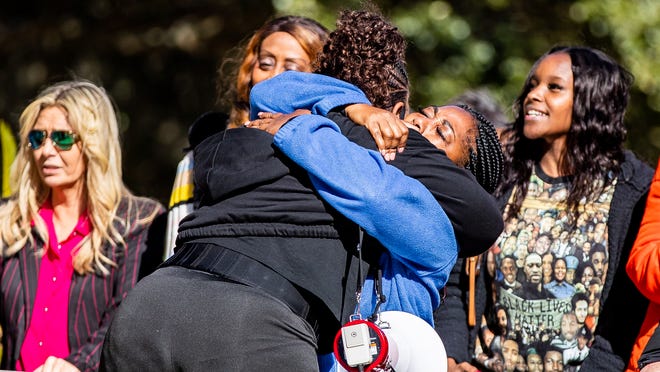Two of the men serving life in prison for the 2020 murder of Ahmaud Arbery are seeking acquittal of their federal hate crimes convictions, according to court documents filed Tuesday.
Federal prosecutors argued last month that father and son Gregory and Travis McMichael and their neighbor William “Roddie” Bryan willfully violated Arbery’s right to enjoy a public road in Brunswick, Georgia, because of his race.
In separate motions for acquittal, the McMichaels’ attorneys argued that prosecutors failed to prove facts of the case, including that Arbery’s killing happened on a public street.
Travis McMichael’s attorney argued in the 43-page document that the neighborhood’s developer offered to make the streets available for public use, but the county did not expressly accept that offer.
Gregory McMichael’s attorney also claimed the government failed to prove he targeted Arbery because of his race. There was no evidence the elder McMichael associated African Americans with crime or that he used racial slurs against Black people, the motion said, echoing arguments made during the trial.
Jurors heard testimony from more than a dozen witnesses about the defendants’ pattern of racial animus and saw text messages and social media posts from Travis McMichael and Bryan that used racial slurs. One witness testified that Gregory McMichael disparaged the late civil rights champion Julian Bond and said he wished all Black people would die.
Bryan’s attorney has not filed a motion for acquittal and the prosecution has not yet responded to the motions, according to court records.
A jury found the three white men guilty of hate crimes and attempted kidnapping in February. The McMichaels were also convicted of using, carrying and brandishing – and in Travis McMichael’s case, firing – a gun during a crime of violence.
The federal conviction came one day before the second anniversary of Arbery’s death and months after the defendants were convicted of murder in state court and sentenced to life in prison. The McMichaels will not have the possibility for parole.
They could each face an additional life sentence for the federal crimes. A sentencing date has not yet been set.
The three men were arrested two months after the shooting on Feb. 23, 2020, when Bryan’s cellphone video of the incident became public and spurred nationwide outrage over what several high-profile figures called a lynching. The killing fueled a growing nationwide movement against anti-Black racism.
AHMAUD ARBERY:What the hate crime verdicts say about justice and race in America
‘SO MUCH HATRED’:Jury foreman speaks about hate crimes trial of men found guilty of murdering Ahmaud Arbery
Contributing: Raisa Habersham, Savannah Morning News
Contact Breaking News Reporter N’dea Yancey-Bragg at [email protected] or follow her on Twitter @NdeaYanceyBragg
Source by rssfeeds.usatoday.com
















































